|
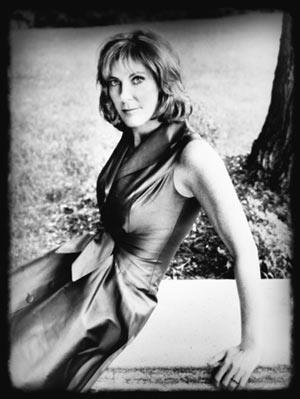
|
| Photo courtesy of Marion Ettlinger |
Deborah Henry’s first short story was
published by The Copperfield Review, was a historical fiction finalist for Solander Magazine of The Historical Novel
Society and was long-listed in the 2009/10 Fish Short Story Prize. The Whipping Club is her first novel and was chosen
for Oprah’s Summer 2012 reading list. She lives in Fairfield, Connecticut, with her husband and their three children.
She is currently at work on her next book. Henry’s work has also been published in The Smoking Poet.
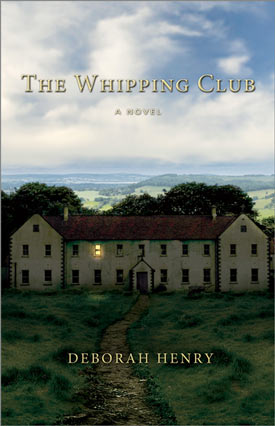
The Smoking Poet: Welcome back
to The Smoking Poet, Deborah! We’ve been watching your literary career for some time, and congratulations not only on
the publication of your debut novel, The Whipping Club, but the critical acclaim it’s received—and being a pick
for the Oprah 2012 Summer Reading book list. Can you give us a synopsis about The Whipping Club?
Deborah Henry: Great to
be here. One of my fondest memories is The Smoking Poet publishing a piece of flash fiction, which eventually became Chapter
34.
THE WHIPPING CLUB is about Ben Ellis (Irish Jew) and Marian McKeever
(Irish Catholic), who feel forced to give away their out-of-wedlock child in 1950’s Dublin and the impact of that decision
on their lives. They eventually marry, have another child and make a new life,
only to find that the nuns at Castleboro Mother Baby Home have sent their son Adrian to the notorious Silverbridge Orphanage
and then to the Surtane Industrial School rather than to America, as the parents spent years believing. The story is a microcosm of the broad suffering wrought by the intimate liaison between the
Catholic Church and the Irish State, particularly on young women and their offspring.
Throughout, it is a reflection on the emotional impact of class, social and religious intolerance on human lives, both
in the not-so-distant past and in the present.
TSP: You’ve said about
your novel that you had to write it because what you found hidden, you had to uncover. Can you elaborate on that?
Henry: Growing up,
I was very close with my Irish grandmother who painted cheery childhood scenes on the family farm in Northern Ireland -- riding
ponies and eating apples off trees. When I began reading nonfiction and memoir for my budding novel, I became aware of negative
undercurrents behind the beauty my grandmother depicted. A dark underbelly of Ireland’s green pastures and generous
people emerged. I read some incredibly well documented books which helped me uncover these sorrowful subjects. Jews in Twentieth-Century
Ireland: Refugees, Anti-Semitism and the Holocaust by Dermot Keogh, Banished Babies, The Secret History of Ireland’s
baby export business by Mike Milotte and the late Mary Raftery’s groundbreaking work Suffer the Little Children: The
Inside Story of Ireland’s Industrial Schools along with heartbreaking memoirs by Bernadette Fahy, Patrick Touher, June
Goulding and Paddy Doyle, among others. I realized, too, that this wasn’t an Irish problem alone. This was, and is,
a worldwide epidemic and needs to be exposed.
Although there were nonfiction accounts and documentaries, particularly,
the groundbreaking States of Fear by the late Mary Raftery as well as memoirs, I had not found a novel which dealt with hidden
atrocities that took place in orphanages, mother baby homes, and industrial schools in the 1960’s -- and well before.
I am a novelist who passionately believes that truth dispels darkness. At least with this debut, I felt compelled to unearth
secrets, unnecessary shames, to leave something discovered that was hidden, to leave something “open and searching and
without hate.”
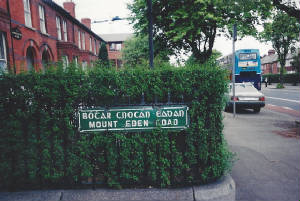
|
| Mount Eden Road |
TSP: There’s a bit of
family history woven into this novel. Something of your parents’ marriage in each being from a different religious background?
How did that influence your writing?
Henry: As a child of
a mixed marriage in the 1950’s, I’ve always been curious about the duality of my Jewish/Irish heritage. When I began thinking about a fictitious child of a mixed marriage in Ireland, I learned that my parent’s
relationship would never have been tolerated across the sea. My budding story
evolved into a manuscript with uncanny similarities to harsh events that took place in Irish orphanages. The more I researched, the more I uncovered a hidden Ireland, an island in which thousands of adults and
children were forcibly separated, many of the “orphans” adopted by American families, and many still live with
a vague sense of identity and a yearning for connection to their roots.
TSP: What kind of research
did you do? The novel goes back into history, another time, another place, and a life beyond what women today (at least in
the United States, although such institutions no doubt still exist in some places) know with “homes” for unwed
mothers and orphanages for their children.
Henry: I spent the better
part of two years engrossed in nonfiction titles and memoirs. The novel takes place in a foreign country I was unfamiliar
with at the time. I read about Jewish roots in Ireland, Anti-Semitism, Mother Baby homes, Irish adoptions, to name a few of
the major topics, as well as listening to audiobooks read by Irish authors to hear the lilt in their voice as I learned from
their novels about the craft of writing. I also studied Irish dictionaries and slang. A unique diction of inflections must
be created at each moment of dialogue. I wrote a chart of the verbal nuances within the Dublin and country dialects for each
character. To develop diction, I read the complete collection of the Pepper books. I joined a group called the Irish Jigs
– the Irish Jewish Interest Group and the members, though scattered throughout the world, had yearly reunions in Ireland
and welcomed my interest and generously answered my questions about their childhoods in the Jewish District of Dublin.
I traveled to Ireland when the research and question sheets
became excessive and there, I would study the smells in the air, the people, the sounds on the street – all the nuances
of Dublin and the suburbs of Dublin where much of the book takes place. Every trip also included interviews with survivors
of orphanages, the industrial school systems, mother baby homes, as well as interviews with police officers, lawyers and members
of the RTE. Overseas, I would search video stores and find films relating to
any of my subjects. Mostly, I found country dramas involving unwanted pregnancies, and converted them to the United States
VCR recording system, and listened as well as watched everything, including mannerisms, dress, flora and fauna, idiosyncrasies
of the culture, to name a few of my concerns. I spent hours at the Irish Jewish Museum, walking the streets of Little Jerusalem
in Dublin, interviewing the elderly at the Jewish Nursing Home. I also spent time with homeowners in Donnybrook.
It took me well over five years to research and write The Whipping
Club. In the early years, I would drop my children at school and drive to a deserted field and write in my car until pick-up
times. During the summers, I would get up a 4:45 a.m. to write for a few hours before the first birds sang and before my children
awoke. As the work developed, I would hole up at The Fitzpatrick Castle Hotel in Killiney, Dublin to research and rewrite.
I have interviewed the late Mary Raftery and Mike Milotte, award-winning Irish journalists, and have received firsthand the
personal testimonies of the survivors of Magdalene laundries, Mother Baby Homes, Orphanages and the Industrial School Systems,
receiving generous help from the best-selling authors, Bernadette Fahy and Paddy Doyle.
I also had the great opportunity to meet with a number of the prominent Jewish community in Dublin, including the family
of Robert Briscoe, the first Jewish Lord Mayor of Dublin, and found their contributions to business, law, medicine and the
arts in Ireland far greater then their numbers would suggest, far greater than most people are aware. My research time in Dublin was extremely helpful, (including a personal note from the late Maeve Binchy.)
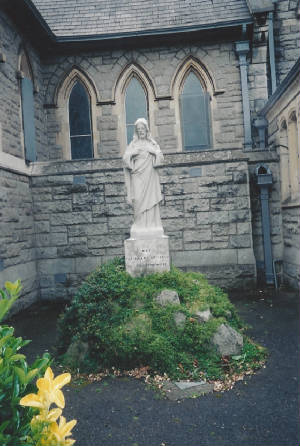
|
| Donnybrook Church |
TSP: What was the overall
message you hope to get across with this novel?
Henry: When I begin
writing, I am not at all sure of overall themes. There is no agenda. I try to allow the characters to have movement and move
the story where it needs to go. There were only a few moments, “moments of clarity” I call them, moments when
a missing piece of the puzzle fell into place as if it were always there waiting to be found. The long ago idea inside me
of illumination, of shining light on evil to restore balance, took form. In the end, themes of forgiveness replaced themes
of anger and resentment. I recognized that love is greater than fear and that if I gave my heart to the characters and let
them breathe, the characters would give back their humanity to the reader. A work of social realism, though told through imaginary
characters and setting, I yearned for the work to touch people’s lives.
TSP: Did you worry at all
when writing The Whipping Club about what you might stir up? In religious circles? In political arenas? Among your own circle
of friends and family? You shine the light on many very dark, very painful issues … Henry: The
first chapter is set in Ireland of the 1950’s and then the story jumps to the 1960’s because the time period is
haunting. So different from the 1960’s in the United States. Much that was happening in those Dark Ages of Ireland appalled
me and I felt it needed to be uncovered. There were some heart wrenching memoirs and some groundbreaking works of nonfiction,
but I did not know of any novels that dealt with Little Jerusalem and/or the cruelties taking place in Mother Baby Homes,
Orphanages and Industrial Schools at the time. Although I am not an orphan nor have I suffered intensive physical abuse, I
was outraged by what I had discovered on this seemingly lovely island where my grandmother had been raised. I was not writing
about the obvious abuses suffered by the poorest of Irish: the women and children of the Magdalene Laundries. My characters
depicted members of the middle class and many of their stories remain untold to this day. Although I tried to bring up the
subjects taking form in The Whipping Club with my husband’s family, my in-laws did not want to listen. I could feel
their worry and distrust and disagreement with my work. Eventually, I dropped the subject and realized there would be those
who would rather not know or for whom the subject was too painful. There are others who might feel that they own the story
and only those who have suffered these types of childhood traumas have a right to write about them. But for the most part,
people are ready. The Whipping Club is timely today and more people are speaking out about these horrific crimes against humanity,
these social, political and religious injustices. That said, though I respect the opinion of others, in general, I do not
spend huge amounts of time worrying about what other people think when I am writing. I write what the characters need to say.
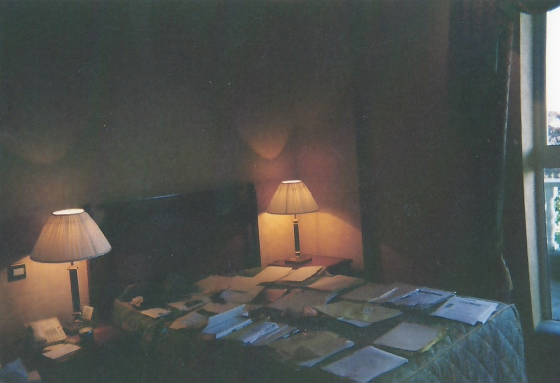
|
| Holed up at Killiney Castle Hotel |
TSP: In writing this, did your
own views change in any way? Any surprises, revelations?
Henry: What surprises
me is that I always seem to come back to forgiveness. It surprised me that the main characters made it to a point that held
no bitterness for their family, their church, their country. They let go of their hate and one senses that reconciliation
and healing could begin. The Whipping Club is not an indictment of the Catholic Church. It is not even an Irish story. It
is a worldwide issue. Acceptance, Anti-Semitism, Interfaith marriages, Dual Faith children, Birth mothers, Adoption, Orphanages,
Child Abuse, Clergy Abuse – all of these issues and more began to arise. But the revelation – When we sweep from
under the carpet, when we acknowledge our dark sides – and we all have dark sides – When we let go of secrets,
shame, fear – When we forgive early missteps, then we begin to move forward.
TSP: This is a work of fiction,
yet you must have brought to life some factual scenarios based on your research. Are any of the scenes (the image of pregnant
girls pulling sheaves of grass as a form of punishment) based on facts you uncovered?
Henry: Yes. That
particular detail shocked me. I discovered that “Many of the institutions kept their lawns manicured in this way –
a long line of children, bent over, moving slowly across the grass plucking each blade by hand. Survivors of Artane and Goldenbridge
Industrial Schools in particular have vivid memories of this practice.” Suffer the Little Children by the late Mary
Raftery.
An interview I conducted with Bernadette Fahy who wrote the memoir
Freedom of Angels stays with me, haunts me. Her experiences in Goldenbridge Orphanage makes my novel read like a fairy tale.
She suggested I use Sister Paulinas as the name of one of the nuns in fictitious Castleboro Mother Baby Home. To read Paddy
Doyle’s The God Squad, a man who grew up in an orphanage and is now a dear friend, is terrifying.
TSP: When it came time to seek
a publisher, what kind of response did you get? After all, there’s some sensitive material here. Or did that help?
Henry: At the time
of submissions about two years ago, the trepidation within the transforming publishing industry was palpable. There were a
few near misses with traditional publishers, - one or two that considered in committee The Whipping Club for several months.
Most editorial comments were powerful and beautiful. I was fortunate to have terrific literary agents along the way. All along,
I sensed, the doors would open. I knew I would never give up on the work.
TSP: Tell us about hearing
that your book was a pick for Oprah’s 2012 Summer Reading list. How has that affected sales and publicity? How has that
affected you as a writer?
Henry: I was in the
auto shop when I received a call to overnight my novel. I raced back into my car and overnighted The Whipping Club. Will Amato
conjured up the cover design. I think it’s a great cover, which grabs you. The pre-publication Kirkus Review, which earned a Kirkus star, led the way. I am deeply grateful for this auspicious beginning from
the Kirkus team. My friends and colleagues from the Fairfield University MFA Program spread the word along with Facebook and
Twitter friends, which helped publicity. Huge help came from the Fairfield University press release, which garnered attention
post-Oprah. I have great respect for Oprah Winfrey and her appreciation for the arts, particularly books. I am deeply honored
to have my debut catch the attention of the O – Oprah Magazine staff.
TSP: What are you working
on now?
Henry: I have begun
another novel with the working title, MADNESS, which takes place during the French Occupation in Paris and follows the travails
of a French woman who has a relationship with a German soldier. I have also recently completed a YA novel, THE BOX OF LETTERS.
I am working on a comedic memoir, DIARY OF A MAD NOVELIST, which discusses the agonizing road to publication in the hopes
that it will help other writers persevere. Now, I will add Oprah to the journalistic memoir and look forward to a shift in
my own publishing dreams.
TSP: Where can our readers
learn more about you? Perhaps catch an author event?
Henry: I am thrilled
to be doing book club events. I love being in someone’s home and discussing writing The Whipping Club and the writing
life with avid readers. I would be eager to fly anywhere to be a part of a book club group. Just say the word! I do a lot
of radio but will update my website on readings, etc. My website: www.deborahhenryauthor.com.
I have started a growing business page where I talk books and
life, too:
www.Facebook.com/DeborahHenryAuthor
TSP: Thank you, Deborah. We
are honored to have you visit us at TSP again, and we will be watching what comes next.
Henry: Looking forward
to sharing the journey with The Smoking Poet! Thanks so much for having me. As always, honored.
|


